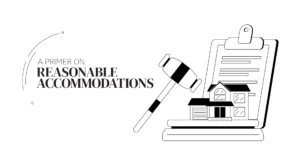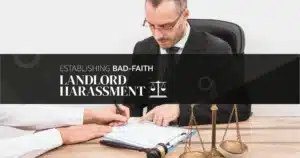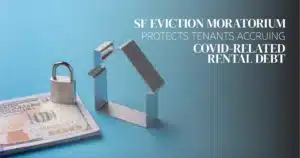Sarah spent months looking for an apartment, and just when she thought she had found her new home, the unit was no longer available. The landlord saw that she was using housing vouchers, and this was a deal breaker.
If this has happened to you, you are not alone.
As if high rents weren’t sufficient, renters now face discrimination, too. It doesn’t matter if you can afford the place or if you have a great credit score.
It is a common practice for landlords to reject applications over seemingly trivial things. Sometimes it is a tenant’s last name, while other times it is the number of children they have.
This is discrimination, and it is illegal.
Understanding Housing Discrimination
Housing discrimination isn’t loud or obvious, which is why you might not know when it is happening to you.
Think about the last time you were apartment hunting. Were you shocked to find that the unit was suddenly listed as “taken” after you showed up to the open house with two kids?
Or were you asked to double your security deposit because you were a “content creator” without a steady 9-5 job?
The most common one is when landlords refuse to provide reasonable accommodations for people with disabilities, saying, “Maybe this place just isn’t the right fit for you.”
If any of these things happened to you, know that it was unfair and illegal.
A 2025 report showed that 54% of landlords discriminated against tenants based on their source of income. Another 23% showed discriminatory behavior against people with disabilities by denying reasonable modifications. And 26% of landlords discriminated against tenants with children.
Landlords and property managers know what they are doing. Most renters fail to recognize when someone violates their rights and leaves them vulnerable.
These numbers tell a story. They tell us just how many tenants have been refused safe housing by landlords. And that the housing discrimination tenant protection laws matter more than ever.
The Role of the Fair Housing Act and Other Laws
If you have ever felt an invisible wall of bias keep you from finding a place to live, just know the law is on your side.
The Fair Housing Act of 1968 (FHA) makes it illegal for landlords or property managers to discriminate against tenants.
But what does it look like in action?
It means that a landlord cannot deny you an apartment just because:
- You’re a single parent
- You have a certain ethnic background
- You asked for a reasonable modification for your wheelchair
California’s Fair Employment and Housing Act (FEHA) and Government Code §12955 protect tenants from discrimination against their race, color, religion, gender, sexual orientation, marital status, national origin, and source of income, among other protected classes.
The California Tenant Protection Act (AB 1482) prevents landlords from evicting tenants without a legitimate reason (such as nonpayment of rent or property damage).
Even with all these laws in place, landlords still don’t fully understand (or follow) these protections. Some of them see laws as just legal fine print, while others are hoping the tenants wouldn’t be aware of their rights.
In either case, tenant protection laws step in to shield tenants from the rampant, unchecked discrimination.
Common Forms of Housing Discrimination Today
Most landlords won’t come out and say, “I won’t rent to you because you’re a Muslim” or “I don’t rent to gay couples”. More often, they will hide behind excuses such as “We don’t rent to people with government assistance,” or “Just rented out the unit,” when it really wasn’t.
And they might get away with it if you don’t know what common forms of housing discrimination look like:
-
Source of Income Discrimination
Refusing to accept Section 8 Vouchers, even though it is a guaranteed income.
-
Reasonable Accommodation and Modifications
Refusing to add grab bars in the bathroom or provide a reserved parking spot
-
Redlining
Refusing based on race and ethnicity, such as Black and immigrant communities.
Why Tenant Protection Laws Matter for Everyone
It is easy to assume that tenant protection laws only protect the tenants and are of no consequence to the rest of us. But you couldn’t be more wrong.
Here’s how you should look at it:
Personal Level
Protecting tenants’ housing rights strengthens marginalized communities, promotes religious tolerance, and advances gender equality. The right to equal housing is the right to a safe and comfortable life. These laws safeguard all of us because we all need and deserve housing.
Social Level
Housing discrimination can result in instability and homelessness. It can push families back into a vicious cycle of poverty and endanger migrant communities. If you care about any of those causes, then you should care when landlords discriminate against tenants.
If workplace discrimination is unacceptable, housing discrimination should be, too.
Economic Level
The housing market is by no means a level playing field, and discrimination against renters is one reason why. By ensuring that everyone has fair housing, landlords can find reliable tenants, reduce vacancy rates, and that means stability in housing prices.
It is all connected. The social, economic, and political impact of tenant protection is undoubtedly beneficial for everyone.
How Tenants Can Protect Themselves
What to do if you are the tenant in this situation? Here’s how you can protect yourself if you ever face discrimination as a tenant.
Document
Document every interaction you have with your landlord or property manager. Save emails, texts, voice notes, and notices from them. Keeping a record of conversations will give you the ability to pinpoint when the discrimination started and what kind of discrimination it was.
Remember, your notes can become critical evidence down the line.
File a Complaint
You can file a complaint under the Tenants Rights Anti-Discrimination Law if you feel that you were treated unfairly by your landlord.
- HUD (U.S. Department of Housing and Urban Development) can investigate violations of the Fair Housing Act
- California Civil Rights Department (CRD) handles state-level complaints under the California Fair Employment and Housing Act (FEHA).
Use Hotlines and Legal Aid
It is normal to be unsure in cases like this. Discrimination is often subtle, and to figure it out, you might need a second opinion. Hotlines such as HUD’s Housing Discrimination Hotline (1-800-669-9777) can guide you on your next steps and even provide free legal aid if you are a low-income tenant.
Talk to a Tenant Rights Attorney
If you need support navigating this overwhelming process, our team is here to guide you every step of the way. The Law Firm for Tenants’ Rights (LFTR) has spent years fighting for tenants across California. We equip our clients with the tools to fight discrimination and harassment.
If you’re facing discrimination today, don’t wait; reach out to us for a free consultation today. You deserve a home, and we will fight for your right to get one.
You don’t have to face this alone.
Frequently Asked Questions
- What is considered housing discrimination under the law?
Housing discrimination happens when landlords, lenders, or property managers treat tenants unfairly because of race, religion, gender, disability, family status, or other protected traits.
- Who is protected under the Fair Housing Act?
Protected classes are legally recognized groups, such as tenants of certain races, religions, genders, or those with disabilities, who are safeguarded against unfair housing practices.
The Act protects people from discrimination based on race, color, religion, sex, national origin, disability, and familial status.
- Can a landlord mark a property as ‘rented’ when it’s not?
No, a landlord cannot legally advertise a property as ‘rented’ when it’s not. Doing so is considered misleading or false advertising.
- Can a landlord refuse to rent to someone using Section 8 or housing vouchers?
No, in California and many states, landlords cannot reject tenants solely because they use housing vouchers or Section 8 assistance.
- What are reasonable accommodations and modifications in housing?
They are changes to rules, policies, or physical spaces (like ramps or service animal allowances) that help people with disabilities access housing equally.
- What actions should tenants take if they believe someone has discriminated against them?
Tenants should document the incident, file a complaint with HUD or local fair housing agencies, and seek legal help if needed.
- How do just-cause eviction laws protect tenants?
These laws prevent landlords from evicting tenants without a valid reason, giving renters more housing stability and protection against retaliation.
- What role does redlining play in today’s housing discrimination?
Although outlawed, redlining’s legacy still limits opportunities for communities of color, contributing to unequal access to housing and wealth gaps.
- Are there additional tenant protections at the state or local level?
Yes, California and many cities provide extra safeguards, like rent control, source-of-income protections, and stricter anti-discrimination rules.
- Where can tenants go for legal help with housing discrimination cases?
Tenants can contact HUD, local fair housing organizations, tenant unions, or legal aid services for free or low-cost legal support.





